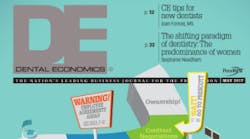How I paid off $200,000+ in student loan debt in just two years
The excitement of graduating from dental school was quickly overshadowed by the looming mountain of student loan debt I realized I had to pay off. Having more than $200,000 in loans was an awful feeling that inhibited spending on my most basic needs. Like anyone, I wanted to earn back my financial freedom as soon as I could, but it was not until I found the right career opportunity with the best financial philosophies and support that I was able to get out from underneath my debt and eventually thrive.
Upon graduation, I quickly began working for a small private practice in the Houston, Texas, area, where the challenges of being a new dentist focused my attention and kept it enjoyable. I was being paid a percentage of my individual production. Yet, after some time, I realized that I wasn’t earning enough to pay my bills—even my minimum payments on my student loans—and it was only worsening.
After doing some investigative work, it was clear the primary dentist was purposefully taking all the self-pay patients with higher-value treatment plans, while I was primarily scheduled with health maintenance organization patients, where the reimbursement rate—and therefore earnings opportunities—were not as significant. I felt stressed and deceived.
Fixing the situation
My workplace situation forced me to do some deep self-reflection. I knew I needed to relocate to a smaller town, where the cost of living was more manageable. I wanted a job where I could have a guaranteed income with the opportunity to earn more, and I wanted to do it in a practice where the culture was focused on working together as a team and patients were the priority. I wanted growth, development, and support to make it all possible.
I knew there had to be opportunities to live stress-free and pay my bills on time. I was hopeful that this dream job was still possible for me.
When I interviewed for the lead dentist position at the Aspen Dental practice in Port Charlotte, Florida, it was clear to me that everything I desired could become reality. I was provided with a clear understanding of what my expectations would be as a practicing clinician and how I’d be able to achieve financial freedom.
Dustin Dixon, DMD, the owner of the office I work in, has built a strong practice in Southwest Florida. Dr. Dixon owns 11 offices, has four partners, and employs more than 20 clinicians. The dentists who work for and with him are paid a percentage of the profits of the entire office. This means that it’s not about my individual production, rather how well the team and I come together to help patients get the care they need.
In my new situation, we’re all in it together. The compensation model is based on the production of everyone—general dentists, oral surgeon, endodontist, and hygienists. We create a team environment where all providers work together to do what’s in the best interest of patients. The office team works together towards a common objective, so dentists are not competing over the types of services they provide, as I had experienced in Houston.
The managing clinical director, the position for which I was hired, earns a percentage of the monthly gross profit of the practice, with the percentage of profits based on patient satisfaction scores. This means that the higher the level of patient satisfaction, the higher percentage of profits I earn. This compensation plan is aligned with my personal values of focusing on quality patient care, and provides unlimited earnings opportunities for clinicians.
However, what was most intriguing was what I was offered in regard to a daily guarantee. I negotiated a daily rate to provide me an advance sum that would allow me to better manage my day-to-day finances. This daily guarantee is deducted from my total profit sharing at the end of each month, which often leaves a sizable “bonus” outside of what is needed for rent, car payments, and the like.
Finding financial and personal success
One of the benefits of operating with the support of a dental support organization (in my case, Aspen Dental Management Inc., or ADMI) is that there are experts to help you navigate complexities. The team of experts at ADMI help me fully understand the profit and loss statement for the practice I manage and how the patient satisfaction scale in that specific office is tabulated. There’s plenty of information and data that allow me to better serve my patients and create synergies within the office to ensure it is always growing and meeting goals.
At home, I stuck to my budget and watched my spending. Refraining from purchasing a house or fancy car, I kept costs to a minimum by keeping it simple: rent was $1,200, car payment was $350, and my minimum payment on student loans was $1,200. What was left over from my daily guarantee was used on occasional shopping and short trips, while I dedicated a significant chunk of my leftover monthly profit-sharing earnings—nearly $10,000 every month—to pay off my student loans.
In the end, it took just two years to pay off $200,000 in student loan debt. I was even able to save enough to begin planning for the future. Paying off my loan so quickly was an incredible feeling—a weight lifted off my shoulders. I am grateful I was able to do it at the pace I did, as debt is not something I wanted to have hanging over my head.
Moreover, operating with the help of a dental support organization allowed me to alleviate my debt while giving me the time and focus to provide the best clinical care possible for my patients. Not only does my salary depend on the satisfaction of my patients, but I’m able to spend most of my time chairside with my patients—which is why I got into dentistry in the first place.
Living the good, debt-free life
Today, I enjoy what I do and have the financial freedom to begin investing and living better. I just traded in my old car for something more fun to drive, and better yet, I’m both stress- and guilt-free about it.
Managing student debt is a tall task for any doctor, especially if you’re a new grad and financial planning is not your forte. My biggest piece of advice to any new dentist is to weigh all your career options and find the best opportunity that fits your values as a clinician and provides you the tools to achieve financial success.
Pranathi Bandi, DDS, is a managing clinical director and lead dentist of the Aspen Dental practice in Port Charlotte, Florida. She graduated from the University of California, San Francisco, School of Dentistry in 2009.
RECOMMENDED
15,000 patients a day: Exclusive interview with Bob Fontana, CEO of Aspen Dental Management Inc. (DentistryIQ/Apex360)
Aspen Dental's #LeadLikeAGirl: Reimagining the demographics of dentistry (DentistryIQ/Apex360)

